《GPU并行计算与CUDA编程》笔记
第一个GPU程序
#include <stdio.h>__global__ void square(float* d_out,float* d_in){int idx = threadIdx.x;float f = d_in[idx];d_out[idx] = f * f;
}int main(int argc,char** argv){const int ARRAY_SIZE = 8;const int ARRAY_BYTES = ARRAY_SIZE * sizeof(float);// generate the input array on the hostfloat h_in[ARRAY_SIZE];for(int i=0;i<ARRAY_SIZE;i++){h_in[i] = float(i);}float h_out[ARRAY_SIZE];// declare GPU memory pointersfloat* d_in;float* d_out;// allocate GPU memorycudaMalloc((void**) &d_in,ARRAY_BYTES);cudaMalloc((void**) &d_out,ARRAY_BYTES);// transfer the array to GPUcudaMemcpy(d_in,h_in,ARRAY_BYTES,cudaMemcpyHostToDevice);// launch the kernelsquare<<<1,ARRAY_SIZE>>>(d_out,d_in);// copy back the result array to the GPUcudaMemcpy(h_out,d_out,ARRAY_BYTES,cudaMemcpyDeviceToHost);// print out the resulting arrayfor(int i=0;i<ARRAY_SIZE;i++){printf("%f",h_out[i]);printf(((i%4) != 3) ? "\t" : "\n");}// free GPU memory allocationcudaFree(d_in);cudaFree(d_out);return 0;
}
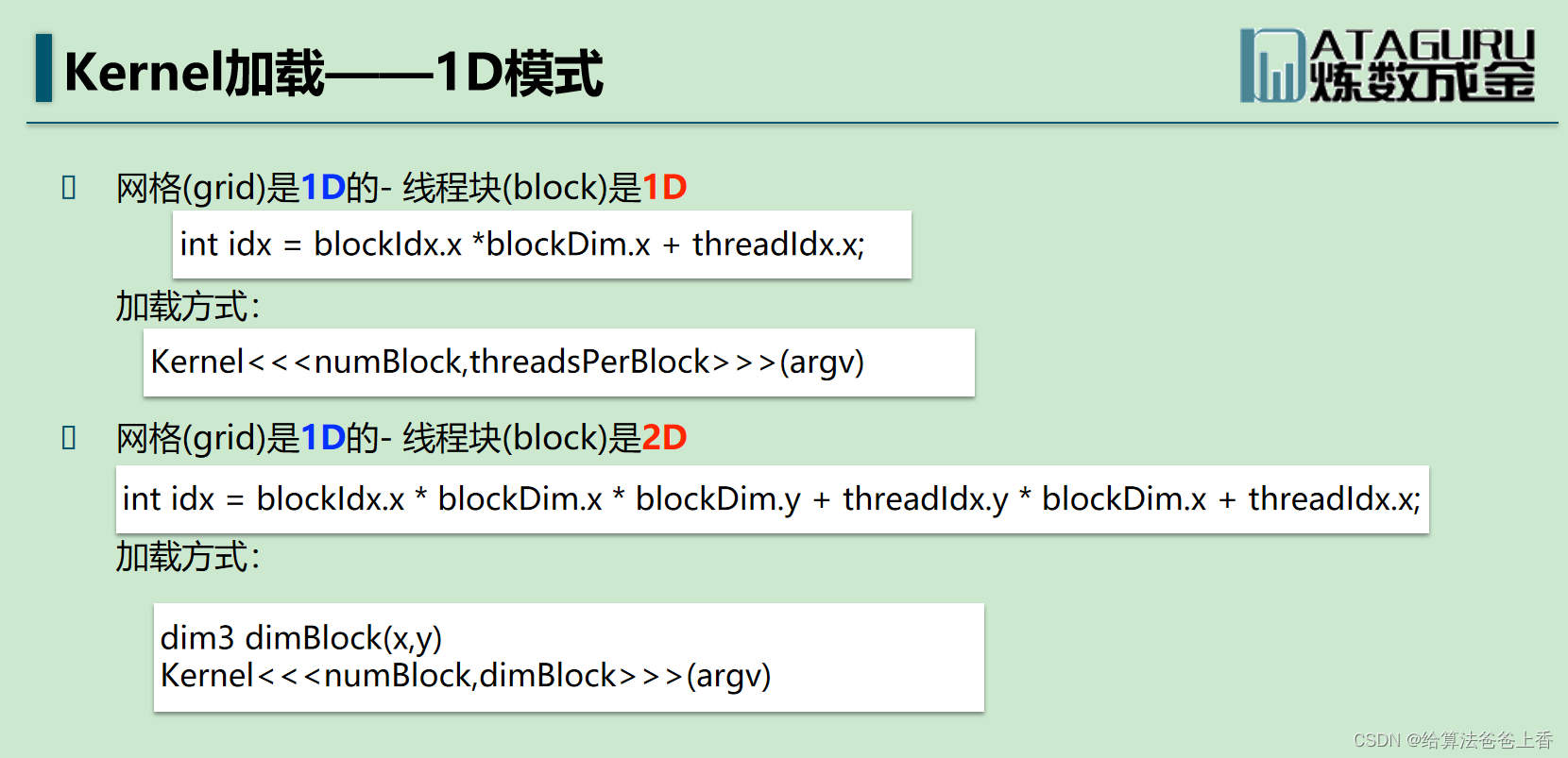

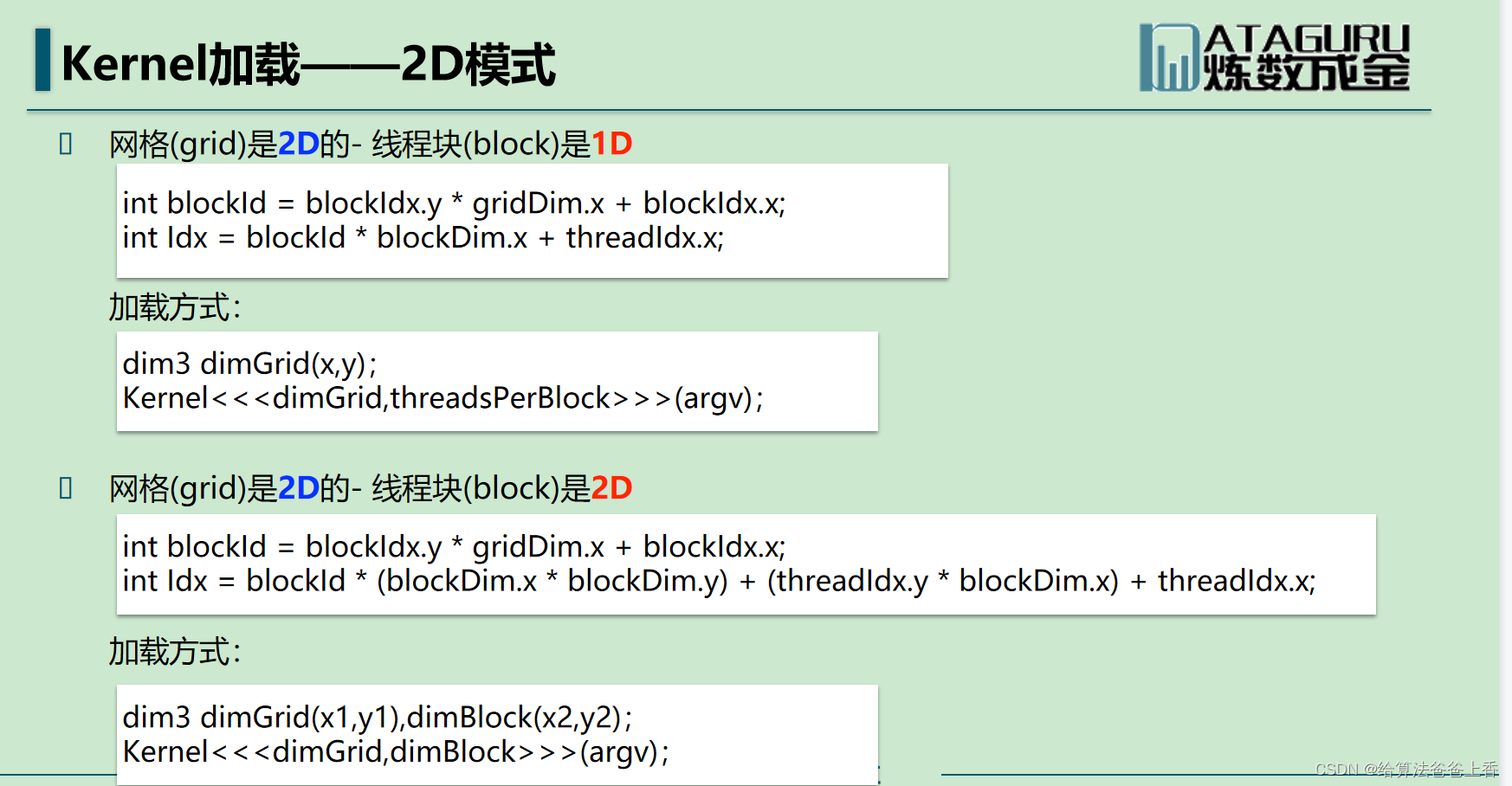

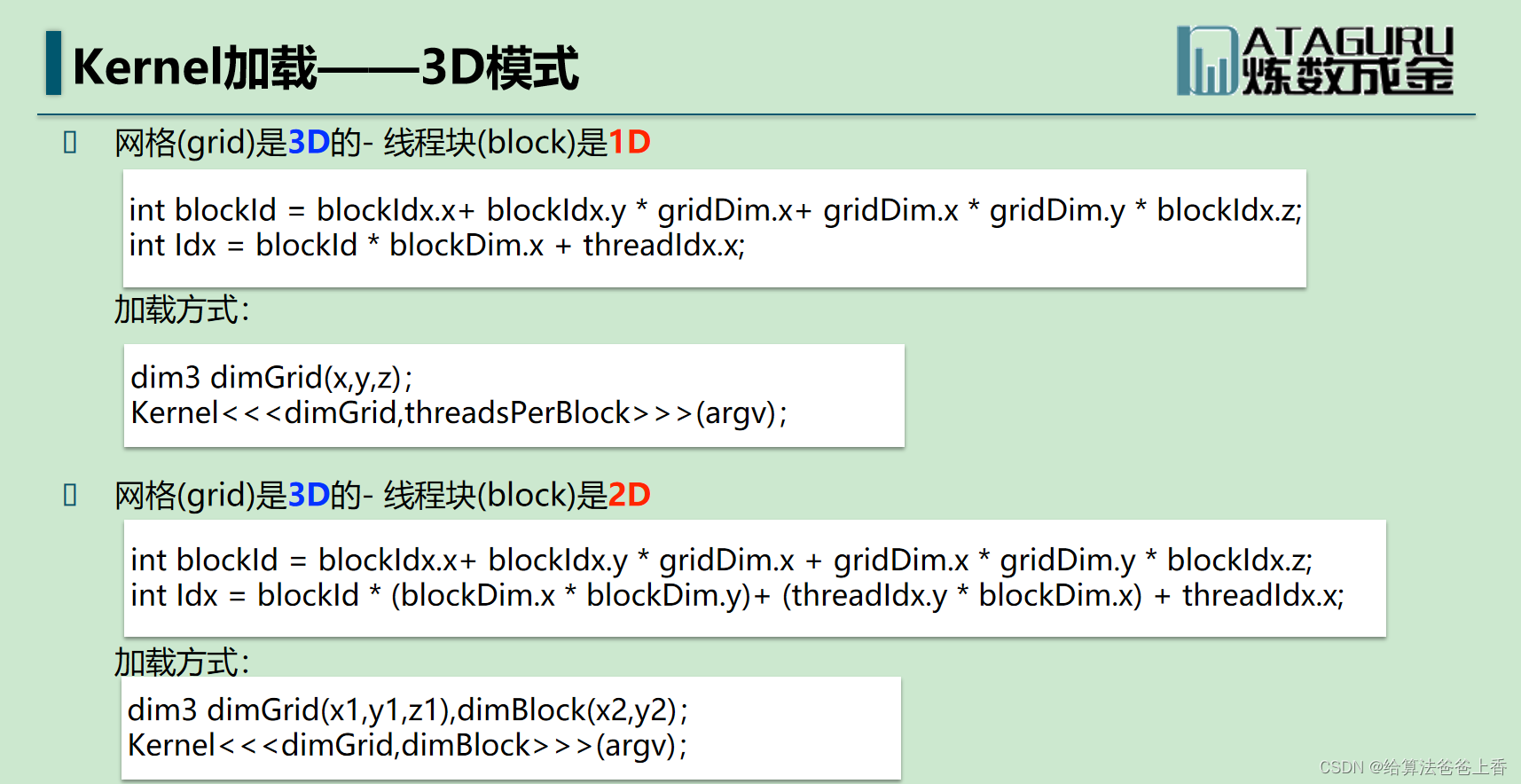

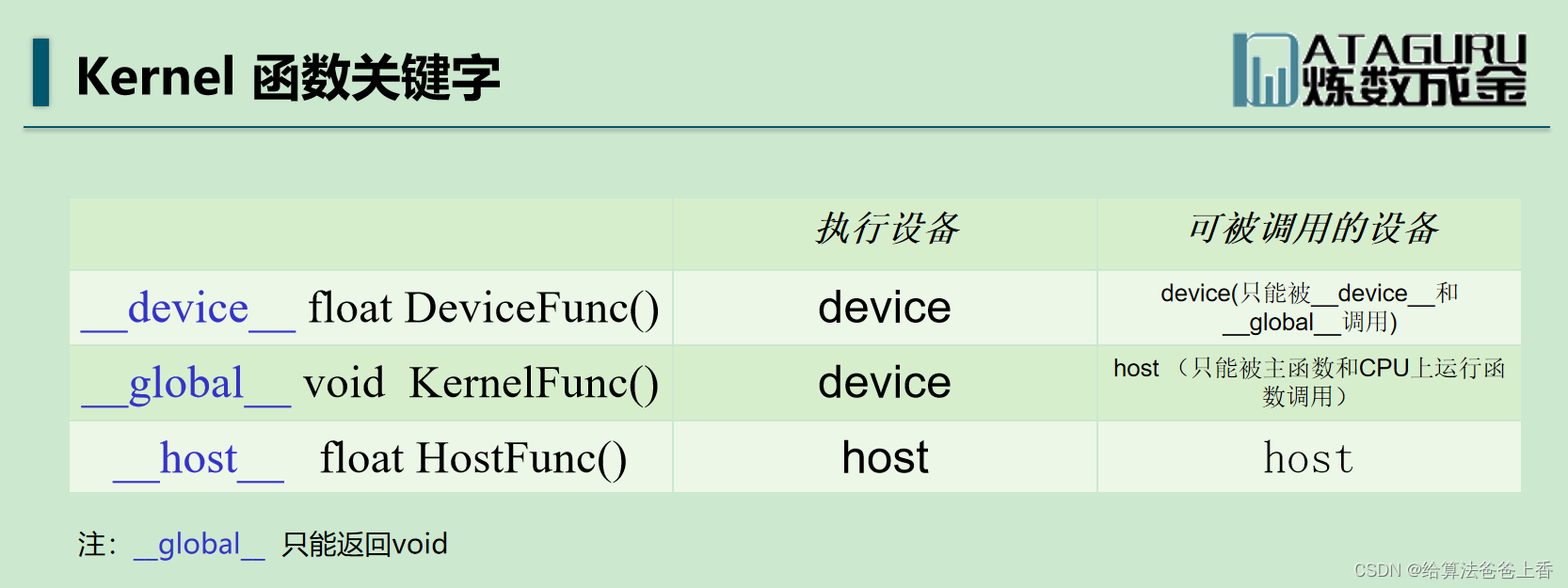
CUDA中的内存
// Using different memory spaces in CUDA
#include <stdio.h>/*********************** using local memory ***********************/// a __device__ or __global__ function runs on the GPU
__global__ void use_local_memory_GPU(float in)
{float f; // variable "f" is in local memory and private to each threadf = in; // parameter "in" is in local memory and private to each thread// ... real code would presumably do other stuff here ...
}/*********************** using global memory ***********************/// a __global__ function runs on the GPU & can be called from host
__global__ void use_global_memory_GPU(float *array)
{// "array" is a pointer into global memory on the devicearray[threadIdx.x] = 2.0f * (float) threadIdx.x;
}/*********************** using shared memory ***********************/// (for clarity, hardcoding 128 threads/elements and omitting out-of-bounds checks)
__global__ void use_shared_memory_GPU(float *array)
{// local variables, private to each threadint i, index = threadIdx.x;float average, sum = 0.0f;// __shared__ variables are visible to all threads in the thread block// and have the same lifetime as the thread block__shared__ float sh_arr[128];// copy data from "array" in global memory to sh_arr in shared memory.// here, each thread is responsible for copying a single element.sh_arr[index] = array[index];__syncthreads(); // ensure all the writes to shared memory have completed// now, sh_arr is fully populated. Let's find the average of all previous elementsfor (i=0; i<index; i++) { sum += sh_arr[i]; }average = sum / (index + 1.0f);// if array[index] is greater than the average of array[0..index-1], replace with average.// since array[] is in global memory, this change will be seen by the host (and potentially // other thread blocks, if any)if (array[index] > average) { array[index] = average; }// the following code has NO EFFECT: it modifies shared memory, but // the resulting modified data is never copied back to global memory// and vanishes when the thread block completessh_arr[index] = 3.14;
}int main(int argc, char **argv)
{/** First, call a kernel that shows using local memory */use_local_memory_GPU<<<1, 128>>>(2.0f);/** Next, call a kernel that shows using global memory*/float h_arr[128]; // convention: h_ variables live on hostfloat *d_arr; // convention: d_ variables live on device (GPU global mem)// allocate global memory on the device, place result in "d_arr"cudaMalloc((void **) &d_arr, sizeof(float) * 128);// now copy data from host memory "h_arr" to device memory "d_arr"cudaMemcpy((void *)d_arr, (void *)h_arr, sizeof(float) * 128, cudaMemcpyHostToDevice);// launch the kernel (1 block of 128 threads)use_global_memory_GPU<<<1, 128>>>(d_arr); // modifies the contents of array at d_arr// copy the modified array back to the host, overwriting contents of h_arrcudaMemcpy((void *)h_arr, (void *)d_arr, sizeof(float) * 128, cudaMemcpyDeviceToHost);// ... do other stuff .../** Next, call a kernel that shows using shared memory*/// as before, pass in a pointer to data in global memoryuse_shared_memory_GPU<<<1, 128>>>(d_arr); // copy the modified array back to the hostcudaMemcpy((void *)h_arr, (void *)d_arr, sizeof(float) * 128, cudaMemcpyHostToDevice);// ... do other stuff ...return 0;
}
规约算法
#include <stdio.h>
#include <stdlib.h>
#include <cuda_runtime.h>__global__ void global_reduce_kernel(float * d_out, float * d_in)
{int myId = threadIdx.x + blockDim.x * blockIdx.x;int tid = threadIdx.x;// do reduction in global memfor (unsigned int s = blockDim.x / 2; s > 0; s >>= 1){if (tid < s){d_in[myId] += d_in[myId + s];}__syncthreads(); // make sure all adds at one stage are done!}// only thread 0 writes result for this block back to global memif (tid == 0){d_out[blockIdx.x] = d_in[myId];}
}__global__ void shmem_reduce_kernel(float * d_out, const float * d_in)
{// sdata is allocated in the kernel call: 3rd arg to <<<b, t, shmem>>>extern __shared__ float sdata[];int myId = threadIdx.x + blockDim.x * blockIdx.x;int tid = threadIdx.x;// load shared mem from global memsdata[tid] = d_in[myId];__syncthreads(); // make sure entire block is loaded!// do reduction in shared memfor (unsigned int s = blockDim.x / 2; s > 0; s >>= 1){if (tid < s){sdata[tid] += sdata[tid + s];}__syncthreads(); // make sure all adds at one stage are done!}// only thread 0 writes result for this block back to global memif (tid == 0){d_out[blockIdx.x] = sdata[0];}
}void reduce(float * d_out, float * d_intermediate, float * d_in, int size, bool usesSharedMemory)
{// assumes that size is not greater than maxThreadsPerBlock^2// and that size is a multiple of maxThreadsPerBlockconst int maxThreadsPerBlock = 1024;int threads = maxThreadsPerBlock;int blocks = size / maxThreadsPerBlock;if (usesSharedMemory){shmem_reduce_kernel<<<blocks, threads, threads * sizeof(float)>>>(d_intermediate, d_in);}else{global_reduce_kernel<<<blocks, threads>>>(d_intermediate, d_in);}// now we're down to one block left, so reduce itthreads = blocks; // launch one thread for each block in prev stepblocks = 1;if (usesSharedMemory){shmem_reduce_kernel<<<blocks, threads, threads * sizeof(float)>>>(d_out, d_intermediate);}else{global_reduce_kernel<<<blocks, threads>>>(d_out, d_intermediate);}
}int main(int argc, char **argv)
{int deviceCount;cudaGetDeviceCount(&deviceCount);if (deviceCount == 0) {fprintf(stderr, "error: no devices supporting CUDA.\n");exit(EXIT_FAILURE);}int dev = 0;cudaSetDevice(dev);cudaDeviceProp devProps;if (cudaGetDeviceProperties(&devProps, dev) == 0){printf("Using device %d:\n", dev);printf("%s; global mem: %dB; compute v%d.%d; clock: %d kHz\n",devProps.name, (int)devProps.totalGlobalMem, (int)devProps.major, (int)devProps.minor, (int)devProps.clockRate);}const int ARRAY_SIZE = 1 << 20;const int ARRAY_BYTES = ARRAY_SIZE * sizeof(float);// generate the input array on the hostfloat h_in[ARRAY_SIZE];float sum = 0.0f;for(int i = 0; i < ARRAY_SIZE; i++) {// generate random float in [-1.0f, 1.0f]h_in[i] = -1.0f + (float)random()/((float)RAND_MAX/2.0f);sum += h_in[i];}// declare GPU memory pointersfloat * d_in, * d_intermediate, * d_out;// allocate GPU memorycudaMalloc((void **) &d_in, ARRAY_BYTES);cudaMalloc((void **) &d_intermediate, ARRAY_BYTES); // overallocatedcudaMalloc((void **) &d_out, sizeof(float));// transfer the input array to the GPUcudaMemcpy(d_in, h_in, ARRAY_BYTES, cudaMemcpyHostToDevice); int whichKernel = 0;if (argc == 2) {whichKernel = atoi(argv[1]);}cudaEvent_t start, stop;cudaEventCreate(&start);cudaEventCreate(&stop);// launch the kernelswitch(whichKernel) {case 0:printf("Running global reduce\n");cudaEventRecord(start, 0);for (int i = 0; i < 100; i++){reduce(d_out, d_intermediate, d_in, ARRAY_SIZE, false);}cudaEventRecord(stop, 0);break;case 1:printf("Running reduce with shared mem\n");cudaEventRecord(start, 0);for (int i = 0; i < 100; i++){reduce(d_out, d_intermediate, d_in, ARRAY_SIZE, true);}cudaEventRecord(stop, 0);break;default:fprintf(stderr, "error: ran no kernel\n");exit(EXIT_FAILURE);}cudaEventSynchronize(stop);float elapsedTime;cudaEventElapsedTime(&elapsedTime, start, stop); elapsedTime /= 100.0f; // 100 trials// copy back the sum from GPUfloat h_out;cudaMemcpy(&h_out, d_out, sizeof(float), cudaMemcpyDeviceToHost);printf("average time elapsed: %f\n", elapsedTime);// free GPU memory allocationcudaFree(d_in);cudaFree(d_intermediate);cudaFree(d_out);return 0;
}
扫描算法
#include <stdio.h>__global__ void global_scan(float* d_out,float* d_in){int idx = threadIdx.x;float out = 0.00f;d_out[idx] = d_in[idx];__syncthreads();for(int interpre=1;interpre<sizeof(d_in);interpre*=2){if(idx-interpre>=0){out = d_out[idx]+d_out[idx-interpre];}__syncthreads();if(idx-interpre>=0){d_out[idx] = out;out = 0.00f;}}
}//TODO:[homework] use shared memory to complete the scan algorithm.
//![Notice]remember to modify the kernel loading.
__global__ void shmem_scan(float* d_out,float* d_in){extern __shared__ float sdata[];int idx = threadIdx.x;float out = 0.00f;sdata[idx] = d_in[idx];__syncthreads();for(int interpre=1;interpre<sizeof(d_in);interpre*=2){ if(idx-interpre>=0){ out = sdata[idx]+sdata[idx-interpre]; } __syncthreads(); if(idx-interpre>=0){ sdata[idx] = out;out = 0.00f; } }d_out[idx] = sdata[idx];
}int main(int argc,char** argv){const int ARRAY_SIZE = 8;const int ARRAY_BYTES = ARRAY_SIZE * sizeof(float);// generate the input array on the hostfloat h_in[ARRAY_SIZE];for(int i=0;i<ARRAY_SIZE;i++){h_in[i] = float(i);}float h_out[ARRAY_SIZE];// declare GPU memory pointersfloat* d_in;float* d_out;// allocate GPU memorycudaMalloc((void**) &d_in,ARRAY_BYTES);cudaMalloc((void**) &d_out,ARRAY_BYTES);// transfer the array to GPUcudaMemcpy(d_in,h_in,ARRAY_BYTES,cudaMemcpyHostToDevice);// launch the kernelshmem_scan<<<1,ARRAY_SIZE,ARRAY_SIZE*sizeof(float)>>>(d_out,d_in);// copy back the result array to the GPUcudaMemcpy(h_out,d_out,ARRAY_BYTES,cudaMemcpyDeviceToHost);// print out the resulting arrayfor(int i=0;i<ARRAY_SIZE;i++){printf("%f",h_out[i]);printf(((i%4) != 3) ? "\t" : "\n");}// free GPU memory allocationcudaFree(d_in);cudaFree(d_out);return 0;
}
GPU计算直方图
方法一:直接做累加(错误)

方法二:原子相加(分组bins越少,并行化程度越低,方法二适合用于分组bins很多的时候)

方法三:局部直方图
第一步:并行计算局部直方图;
第二步:把所有局部直方图每个分组bin使用Reduction(归约)并行累加起来行程一个总的直方图。
#include <stdio.h>
#include <cuda_runtime.h>int log2(int i)
{int r = 0;while (i >>= 1) r++;return r;
}int bit_reverse(int w, int bits)
{int r = 0;for (int i = 0; i < bits; i++){int bit = (w & (1 << i)) >> i;r |= bit << (bits - i - 1);}return r;
}__global__ void naive_histo(int *d_bins, const int *d_in, const int BIN_COUNT)
{int myId = threadIdx.x + blockDim.x * blockIdx.x;int myItem = d_in[myId];int myBin = myItem % BIN_COUNT;d_bins[myBin]++;
}__global__ void simple_histo(int *d_bins, const int *d_in, const int BIN_COUNT)
{int myId = threadIdx.x + blockDim.x * blockIdx.x;int myItem = d_in[myId];int myBin = myItem % BIN_COUNT;atomicAdd(&(d_bins[myBin]), 1);
}int main(int argc, char **argv)
{int deviceCount;cudaGetDeviceCount(&deviceCount);if (deviceCount == 0) {fprintf(stderr, "error: no devices supporting CUDA.\n");exit(EXIT_FAILURE);}int dev = 0;cudaSetDevice(dev);cudaDeviceProp devProps;if (cudaGetDeviceProperties(&devProps, dev) == 0){printf("Using device %d:\n", dev);printf("%s; global mem: %dB; compute v%d.%d; clock: %d kHz\n",devProps.name, (int)devProps.totalGlobalMem, (int)devProps.major, (int)devProps.minor, (int)devProps.clockRate);}const int ARRAY_SIZE = 65536;const int ARRAY_BYTES = ARRAY_SIZE * sizeof(int);const int BIN_COUNT = 16;const int BIN_BYTES = BIN_COUNT * sizeof(int);// generate the input array on the hostint h_in[ARRAY_SIZE];for(int i = 0; i < ARRAY_SIZE; i++) {h_in[i] = bit_reverse(i, log2(ARRAY_SIZE));}int h_bins[BIN_COUNT];for(int i = 0; i < BIN_COUNT; i++) {h_bins[i] = 0;}// declare GPU memory pointersint * d_in;int * d_bins;// allocate GPU memorycudaMalloc((void **) &d_in, ARRAY_BYTES);cudaMalloc((void **) &d_bins, BIN_BYTES);// transfer the arrays to the GPUcudaMemcpy(d_in, h_in, ARRAY_BYTES, cudaMemcpyHostToDevice); cudaMemcpy(d_bins, h_bins, BIN_BYTES, cudaMemcpyHostToDevice); int whichKernel = 0;if (argc == 2) {whichKernel = atoi(argv[1]);}// launch the kernelswitch(whichKernel) {case 0:printf("Running naive histo\n");naive_histo<<<ARRAY_SIZE / 64, 64>>>(d_bins, d_in, BIN_COUNT);break;case 1:printf("Running simple histo\n");simple_histo<<<ARRAY_SIZE / 64, 64>>>(d_bins, d_in, BIN_COUNT);break;default:fprintf(stderr, "error: ran no kernel\n");exit(EXIT_FAILURE);}// copy back the sum from GPUcudaMemcpy(h_bins, d_bins, BIN_BYTES, cudaMemcpyDeviceToHost);for(int i = 0; i < BIN_COUNT; i++) {printf("bin %d: count %d\n", i, h_bins[i]);}// free GPU memory allocationcudaFree(d_in);cudaFree(d_bins);return 0;
}
并行化实现图像的RGB转灰度图
#include <iostream>
#include <string>
#include <cassert>#include <opencv2/core/core.hpp>
#include <opencv2/highgui/highgui.hpp>
#include <opencv2/opencv.hpp>#include <cuda.h>
#include <cuda_runtime.h>
#include <cuda_runtime_api.h>#define checkCudaErrors(val) check( (val), #val, __FILE__, __LINE__)cv::Mat imageRGBA;
cv::Mat imageGrey;uchar4 *d_rgbaImage__;
unsigned char *d_greyImage__;size_t numRows() { return imageRGBA.rows; }
size_t numCols() { return imageRGBA.cols; }template<typename T>
void check(T err, const char* const func, const char* const file, const int line) {if (err != cudaSuccess) {std::cerr << "CUDA error at: " << file << ":" << line << std::endl;std::cerr << cudaGetErrorString(err) << " " << func << std::endl;exit(1);}
}void preProcess(uchar4 **inputImage, unsigned char **greyImage,uchar4 **d_rgbaImage, unsigned char **d_greyImage,const std::string &filename) {//make sure the context initializes okcheckCudaErrors(cudaFree(0));cv::Mat image;image = cv::imread(filename.c_str(), CV_LOAD_IMAGE_COLOR);if (image.empty()) {std::cerr << "Couldn't open file: " << filename << std::endl;exit(1);}cv::cvtColor(image, imageRGBA, CV_BGR2RGBA);//allocate memory for the outputimageGrey.create(image.rows, image.cols, CV_8UC1);//This shouldn't ever happen given the way the images are created//at least based upon my limited understanding of OpenCV, but better to checkif (!imageRGBA.isContinuous() || !imageGrey.isContinuous()) {std::cerr << "Images aren't continuous!! Exiting." << std::endl;exit(1);}*inputImage = (uchar4 *)imageRGBA.ptr<unsigned char>(0);*greyImage = imageGrey.ptr<unsigned char>(0);const size_t numPixels = numRows() * numCols();//allocate memory on the device for both input and outputcheckCudaErrors(cudaMalloc(d_rgbaImage, sizeof(uchar4) * numPixels));checkCudaErrors(cudaMalloc(d_greyImage, sizeof(unsigned char) * numPixels));checkCudaErrors(cudaMemset(*d_greyImage, 0, numPixels * sizeof(unsigned char))); //make sure no memory is left laying around//copy input array to the GPUcheckCudaErrors(cudaMemcpy(*d_rgbaImage, *inputImage, sizeof(uchar4) * numPixels, cudaMemcpyHostToDevice));d_rgbaImage__ = *d_rgbaImage;d_greyImage__ = *d_greyImage;
}__global__
void rgba_to_greyscale(const uchar4* const rgbaImage,unsigned char* const greyImage,int numRows, int numCols){int threadId = blockIdx.x * blockDim.x * blockDim.y + threadIdx.y * blockDim.x + threadIdx.x;if (threadId < numRows * numCols){const unsigned char R = rgbaImage[threadId].x;const unsigned char G = rgbaImage[threadId].y;const unsigned char B = rgbaImage[threadId].z;greyImage[threadId] = .299f * R + .587f * G + .114f * B;}
}void postProcess(const std::string& output_file, unsigned char* data_ptr) {cv::Mat output(numRows(), numCols(), CV_8UC1, (void*)data_ptr);//output the imagecv::imwrite(output_file.c_str(), output);
}void cleanup(){//cleanupcudaFree(d_rgbaImage__);cudaFree(d_greyImage__);
}int main(int argc,char* argv[]){//load input filestd::string input_file = argv[1];//define output filestd::string output_file = argv[2];uchar4 *h_rgbaImage, *d_rgbaImage;unsigned char *h_greyImage, *d_greyImage;//load the image and give us our input and output pointerspreProcess(&h_rgbaImage, &h_greyImage, &d_rgbaImage, &d_greyImage, input_file);int thread = 16;int grid = (numRows()*numCols() + thread - 1)/ (thread * thread);const dim3 blockSize(thread, thread);const dim3 gridSize(grid);rgba_to_greyscale<<<gridSize, blockSize>>>(d_rgbaImage, d_greyImage, numRows(), numCols());cudaDeviceSynchronize(); //checkCudaErrors(cudaGetLastError());size_t numPixels = numRows()*numCols();checkCudaErrors(cudaMemcpy(h_greyImage, d_greyImage, sizeof(unsigned char) * numPixels, cudaMemcpyDeviceToHost));//check results and output the grey imagepostProcess(output_file, h_greyImage);cleanup();
}
并行化实现图像的均值模糊处理
#include <iostream>
#include <string>
#include <cassert>#include <opencv2/core/core.hpp>
#include <opencv2/highgui/highgui.hpp>
#include <opencv2/opencv.hpp>#include <cuda.h>
#include <cuda_runtime.h>
#include <cuda_runtime_api.h>#define checkCudaErrors(val) check( (val), #val, __FILE__, __LINE__)cv::Mat imageInputRGBA;
cv::Mat imageOutputRGBA;uchar4 *d_inputImageRGBA__;
uchar4 *d_outputImageRGBA__;float *h_filter__;size_t numRows() { return imageInputRGBA.rows; }
size_t numCols() { return imageInputRGBA.cols; }template<typename T>
void check(T err, const char* const func, const char* const file, const int line) {if (err != cudaSuccess) {std::cerr << "CUDA error at: " << file << ":" << line << std::endl;std::cerr << cudaGetErrorString(err) << " " << func << std::endl;exit(1);}
}void preProcess(uchar4 **h_inputImageRGBA, uchar4 **h_outputImageRGBA,uchar4 **d_inputImageRGBA, uchar4 **d_outputImageRGBA,unsigned char **d_redBlurred,unsigned char **d_greenBlurred,unsigned char **d_blueBlurred,float **h_filter, int *filterWidth,const std::string &filename) {//make sure the context initializes okcheckCudaErrors(cudaFree(0));cv::Mat image = cv::imread(filename.c_str(), CV_LOAD_IMAGE_COLOR);if (image.empty()) {std::cerr << "Couldn't open file: " << filename << std::endl;exit(1);}cv::cvtColor(image, imageInputRGBA, CV_BGR2RGBA);//allocate memory for the outputimageOutputRGBA.create(image.rows, image.cols, CV_8UC4);//This shouldn't ever happen given the way the images are created//at least based upon my limited understanding of OpenCV, but better to checkif (!imageInputRGBA.isContinuous() || !imageOutputRGBA.isContinuous()) {std::cerr << "Images aren't continuous!! Exiting." << std::endl;exit(1);}*h_inputImageRGBA = (uchar4 *)imageInputRGBA.ptr<unsigned char>(0);*h_outputImageRGBA = (uchar4 *)imageOutputRGBA.ptr<unsigned char>(0);const size_t numPixels = numRows() * numCols();//allocate memory on the device for both input and outputcheckCudaErrors(cudaMalloc(d_inputImageRGBA, sizeof(uchar4) * numPixels));checkCudaErrors(cudaMalloc(d_outputImageRGBA, sizeof(uchar4) * numPixels));checkCudaErrors(cudaMemset(*d_outputImageRGBA, 0, numPixels * sizeof(uchar4))); //make sure no memory is left laying around//copy input array to the GPUcheckCudaErrors(cudaMemcpy(*d_inputImageRGBA, *h_inputImageRGBA, sizeof(uchar4) * numPixels, cudaMemcpyHostToDevice));d_inputImageRGBA__ = *d_inputImageRGBA;d_outputImageRGBA__ = *d_outputImageRGBA;//now create the filter that they will useconst int blurKernelWidth = 9;const float blurKernelSigma = 2.;*filterWidth = blurKernelWidth;//create and fill the filter we will convolve with*h_filter = new float[blurKernelWidth * blurKernelWidth];h_filter__ = *h_filter;float filterSum = 0.f; //for normalizationfor (int r = -blurKernelWidth/2; r <= blurKernelWidth/2; ++r) {for (int c = -blurKernelWidth/2; c <= blurKernelWidth/2; ++c) {float filterValue = expf( -(float)(c * c + r * r) / (2.f * blurKernelSigma * blurKernelSigma));(*h_filter)[(r + blurKernelWidth/2) * blurKernelWidth + c + blurKernelWidth/2] = filterValue;filterSum += filterValue;}}float normalizationFactor = 1.f / filterSum;for (int r = -blurKernelWidth/2; r <= blurKernelWidth/2; ++r) {for (int c = -blurKernelWidth/2; c <= blurKernelWidth/2; ++c) {(*h_filter)[(r + blurKernelWidth/2) * blurKernelWidth + c + blurKernelWidth/2] *= normalizationFactor;}}//blurredcheckCudaErrors(cudaMalloc(d_redBlurred,sizeof(unsigned char) * numPixels));checkCudaErrors(cudaMalloc(d_greenBlurred,sizeof(unsigned char) * numPixels));checkCudaErrors(cudaMalloc(d_blueBlurred,sizeof(unsigned char) * numPixels));checkCudaErrors(cudaMemset(*d_redBlurred,0,sizeof(unsigned char) * numPixels));checkCudaErrors(cudaMemset(*d_greenBlurred,0,sizeof(unsigned char) * numPixels));checkCudaErrors(cudaMemset(*d_blueBlurred,0,sizeof(unsigned char) * numPixels));//make sure the context initializes okcheckCudaErrors(cudaFree(0));}__global__
void gaussian_blur(const unsigned char* const inputChannel,unsigned char* const outputChannel,int numRows, int numCols,const float* const filter, const int filterWidth)
{const int2 thread_2D_pos = make_int2( blockIdx.x * blockDim.x + threadIdx.x,blockIdx.y * blockDim.y + threadIdx.y);const int thread_1D_pos = thread_2D_pos.y * numCols + thread_2D_pos.x;const int absolute_image_position_x = thread_2D_pos.x;const int absolute_image_position_y = thread_2D_pos.y;if ( absolute_image_position_x >= numCols ||absolute_image_position_y >= numRows ){return;}float color = 0.0f;for(int py=0; py < filterWidth; py++){for(int px=0; px < filterWidth; px++){int c_x = absolute_image_position_x + px - filterWidth / 2;int c_y = absolute_image_position_y + py - filterWidth / 2;c_x = min(max(c_x, 0), numCols - 1);c_y = min(max(c_y, 0), numRows - 1);float filter_value = filter[py*filterWidth + px];color += filter_value*static_cast<float>(inputChannel[c_y*numCols + c_x]);}}outputChannel[thread_1D_pos] = color;
}//This kernel takes in an image represented as a uchar4 and splits
//it into three images consisting of only one color channel each
__global__
void separateChannels(const uchar4* const inputImageRGBA,int numRows,int numCols,unsigned char* const redChannel,unsigned char* const greenChannel,unsigned char* const blueChannel)
{// NOTE: Be careful not to try to access memory that is outside the bounds of// the image. You'll want code that performs the following check before accessing// GPU memory:const int2 thread_2D_pos = make_int2( blockIdx.x * blockDim.x + threadIdx.x,blockIdx.y * blockDim.y + threadIdx.y);const int thread_1D_pos = thread_2D_pos.y * numCols + thread_2D_pos.x;const int absolute_image_position_x = thread_2D_pos.x;const int absolute_image_position_y = thread_2D_pos.y;if ( absolute_image_position_x >= numCols ||absolute_image_position_y >= numRows ){return;}redChannel[thread_1D_pos] = inputImageRGBA[thread_1D_pos].x;greenChannel[thread_1D_pos] = inputImageRGBA[thread_1D_pos].y;blueChannel[thread_1D_pos] = inputImageRGBA[thread_1D_pos].z;
}//This kernel takes in three color channels and recombines them
//into one image. The alpha channel is set to 255 to represent
//that this image has no transparency.
__global__
void recombineChannels(const unsigned char* const redChannel,const unsigned char* const greenChannel,const unsigned char* const blueChannel,uchar4* const outputImageRGBA,int numRows,int numCols)
{const int2 thread_2D_pos = make_int2( blockIdx.x * blockDim.x + threadIdx.x,blockIdx.y * blockDim.y + threadIdx.y);const int thread_1D_pos = thread_2D_pos.y * numCols + thread_2D_pos.x;//make sure we don't try and access memory outside the image//by having any threads mapped there return earlyif (thread_2D_pos.x >= numCols || thread_2D_pos.y >= numRows)return;unsigned char red = redChannel[thread_1D_pos];unsigned char green = greenChannel[thread_1D_pos];unsigned char blue = blueChannel[thread_1D_pos];//Alpha should be 255 for no transparencyuchar4 outputPixel = make_uchar4(red, green, blue, 255);outputImageRGBA[thread_1D_pos] = outputPixel;
}unsigned char *d_red, *d_green, *d_blue;
float *d_filter;void allocateMemoryAndCopyToGPU(const size_t numRowsImage, const size_t numColsImage,const float* const h_filter, const size_t filterWidth)
{//allocate memory for the three different channels//originalcheckCudaErrors(cudaMalloc(&d_red, sizeof(unsigned char) * numRowsImage * numColsImage));checkCudaErrors(cudaMalloc(&d_green, sizeof(unsigned char) * numRowsImage * numColsImage));checkCudaErrors(cudaMalloc(&d_blue, sizeof(unsigned char) * numRowsImage * numColsImage));//Allocate memory for the filter on the GPU//Use the pointer d_filter that we have already declared for you//You need to allocate memory for the filter with cudaMalloc//be sure to use checkCudaErrors like the above examples to//be able to tell if anything goes wrong//IMPORTANT: Notice that we pass a pointer to a pointer to cudaMalloccheckCudaErrors(cudaMalloc(&d_filter, sizeof( float) * filterWidth * filterWidth));//Copy the filter on the host (h_filter) to the memory you just allocated//on the GPU. cudaMemcpy(dst, src, numBytes, cudaMemcpyHostToDevice);//Remember to use checkCudaErrors!checkCudaErrors(cudaMemcpy(d_filter, h_filter, sizeof(float) * filterWidth * filterWidth, cudaMemcpyHostToDevice));}void postProcess(const std::string& output_file, uchar4* data_ptr) {cv::Mat output(numRows(), numCols(), CV_8UC4, (void*)data_ptr);cv::Mat imageOutputBGR;cv::cvtColor(output, imageOutputBGR, CV_RGBA2BGR);//output the imagecv::imwrite(output_file.c_str(), imageOutputBGR);
}void cleanup(){//cleanupcudaFree(d_inputImageRGBA__);cudaFree(d_outputImageRGBA__);delete[] h_filter__;
}int main(int argc,char* argv[]){//load input filestd::string input_file = argv[1];//define output filestd::string output_file = argv[2];uchar4 *h_inputImageRGBA, *d_inputImageRGBA;uchar4 *h_outputImageRGBA, *d_outputImageRGBA;unsigned char *d_redBlurred, *d_greenBlurred, *d_blueBlurred;float *h_filter;int filterWidth;//load the image and give us our input and output pointerspreProcess(&h_inputImageRGBA, &h_outputImageRGBA, &d_inputImageRGBA, &d_outputImageRGBA,&d_redBlurred, &d_greenBlurred, &d_blueBlurred,&h_filter, &filterWidth, input_file);allocateMemoryAndCopyToGPU(numRows(), numCols(), h_filter, filterWidth);const dim3 blockSize(16, 16);const dim3 gridSize(numCols()/blockSize.x+1,numRows()/blockSize.y+1);//Launch a kernel for separating the RGBA image into different color channelsseparateChannels<<<gridSize, blockSize>>>(d_inputImageRGBA,numRows(),numCols(),d_red,d_green,d_blue);cudaDeviceSynchronize(); //checkCudaErrors(cudaGetLastError());//Call your convolution kernel here 3 times, once for each color channel.gaussian_blur<<<gridSize, blockSize>>>(d_red,d_redBlurred,numRows(),numCols(),d_filter,filterWidth);cudaDeviceSynchronize(); //checkCudaErrors(cudaGetLastError());gaussian_blur<<<gridSize, blockSize>>>(d_green,d_greenBlurred,numRows(),numCols(),d_filter,filterWidth);cudaDeviceSynchronize(); //checkCudaErrors(cudaGetLastError());gaussian_blur<<<gridSize, blockSize>>>(d_blue,d_blueBlurred,numRows(),numCols(),d_filter,filterWidth);cudaDeviceSynchronize(); //checkCudaErrors(cudaGetLastError());// Now we recombine your results. We take care of launching this kernel for you.//// NOTE: This kernel launch depends on the gridSize and blockSize variables,// which you must set yourself.recombineChannels<<<gridSize, blockSize>>>(d_redBlurred,d_greenBlurred,d_blueBlurred,d_outputImageRGBA,numRows(),numCols());cudaDeviceSynchronize(); //checkCudaErrors(cudaGetLastError());size_t numPixels = numRows()*numCols();//copy the output back to the hostcheckCudaErrors(cudaMemcpy(h_outputImageRGBA, d_outputImageRGBA__, sizeof(uchar4) * numPixels, cudaMemcpyDeviceToHost));postProcess(output_file, h_outputImageRGBA);checkCudaErrors(cudaFree(d_redBlurred));checkCudaErrors(cudaFree(d_greenBlurred));checkCudaErrors(cudaFree(d_blueBlurred));cleanup();return 0;
}
GPU程序优化–以矩阵转置为例
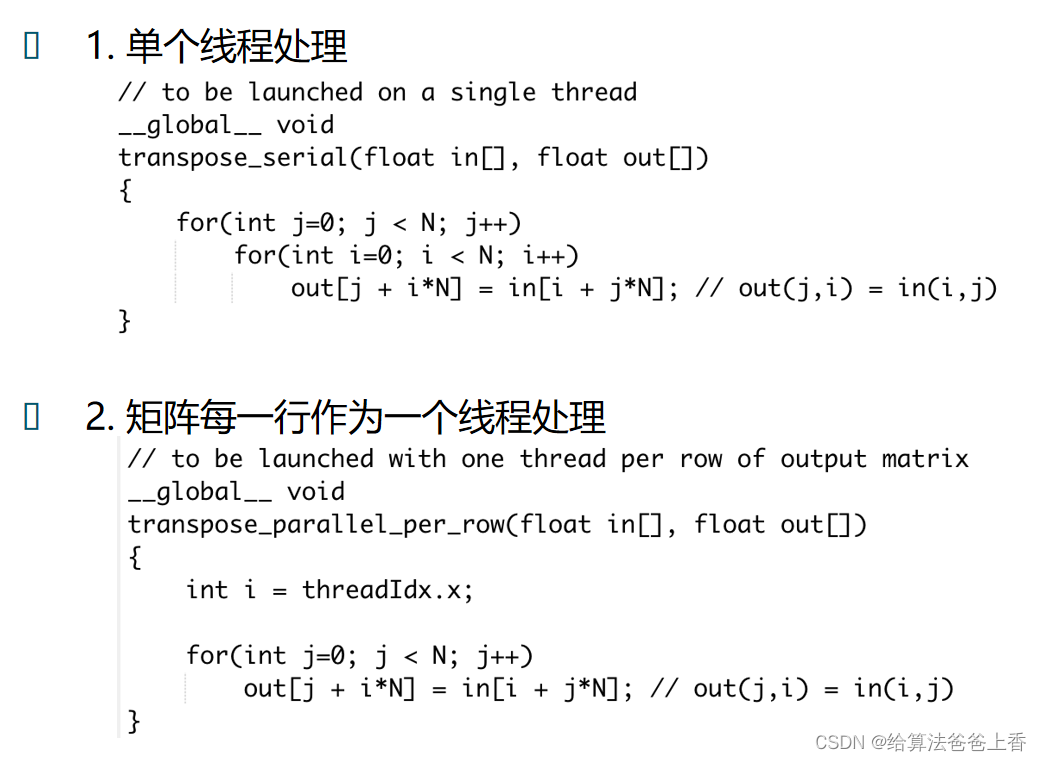
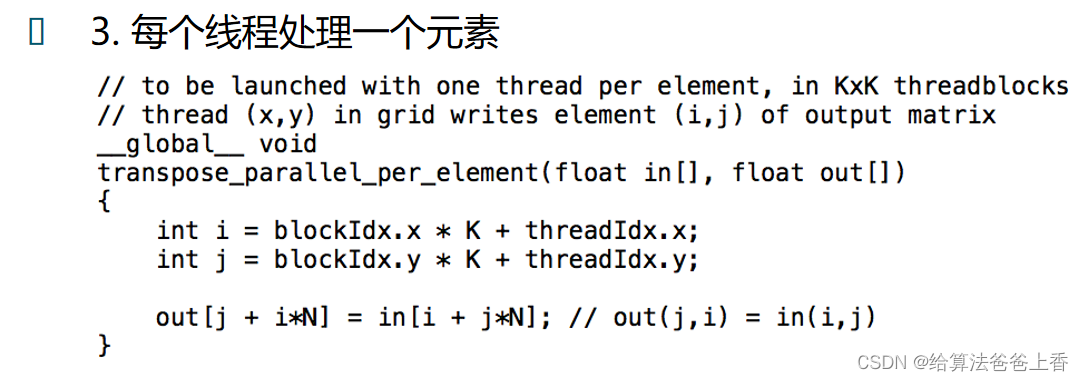
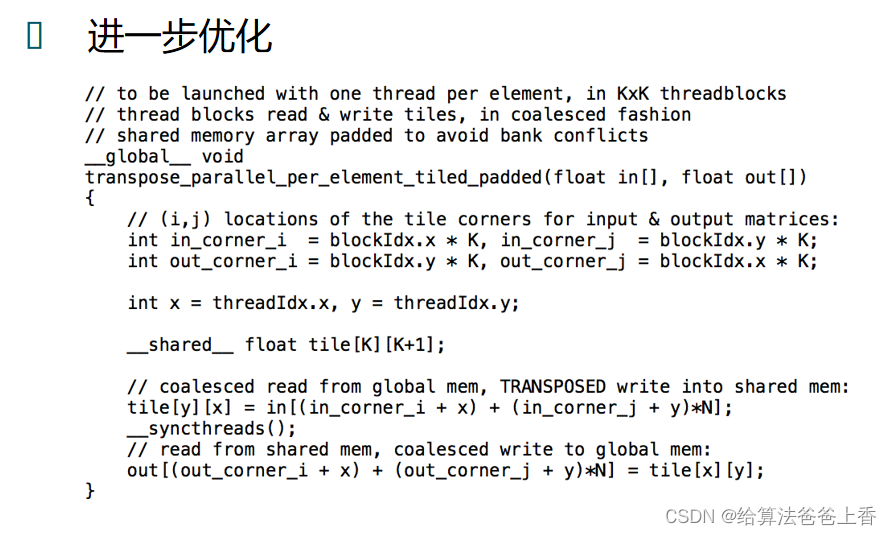
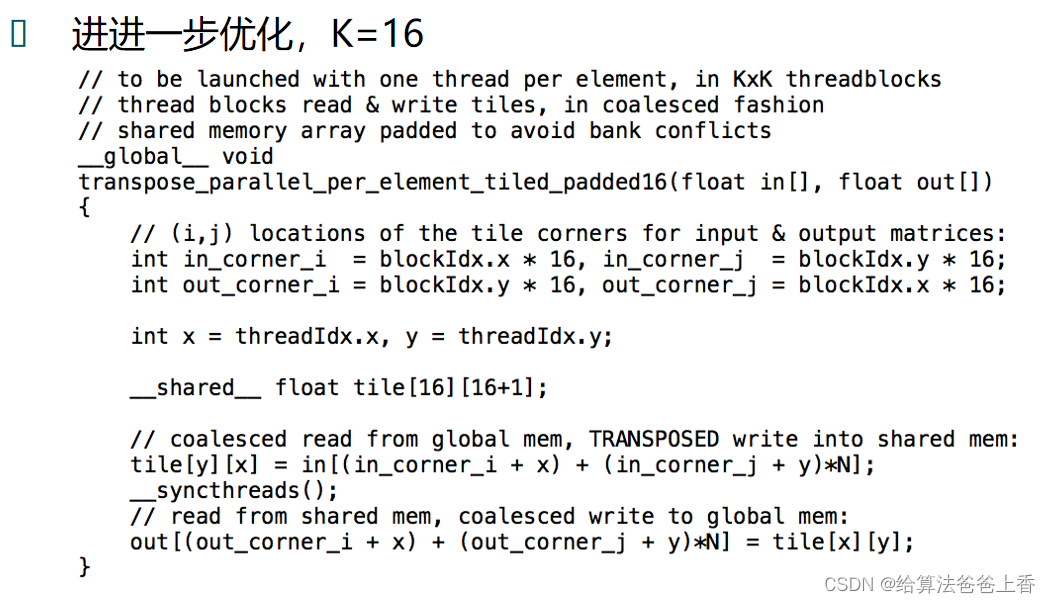
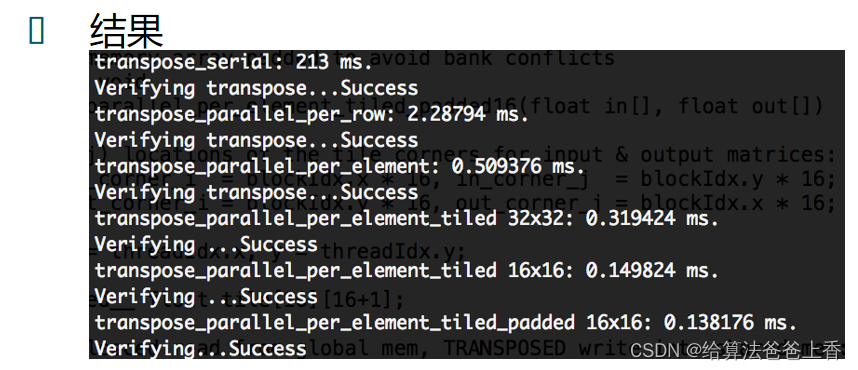
#include <stdio.h>
#include "gputimer.h"const int N= 1024; // matrix size is NxN
const int K= 32; // tile size is KxK// Utility functions: compare, print, and fill matrices
#define checkCudaErrors(val) check( (val), #val, __FILE__, __LINE__)template<typename T>
void check(T err, const char* const func, const char* const file, const int line)
{if (err != cudaSuccess) {fprintf(stderr, "CUDA error at: %s : %d\n", file,line);fprintf(stderr, "%s %s\n", cudaGetErrorString(err), func);;exit(1);}
}int compare_matrices(float *gpu, float *ref)
{int result = 0;for(int j=0; j < N; j++)for(int i=0; i < N; i++)if (ref[i + j*N] != gpu[i + j*N]){// printf("reference(%d,%d) = %f but test(%d,%d) = %f\n",// i,j,ref[i+j*N],i,j,test[i+j*N]);result = 1;}return result;
}void print_matrix(float *mat)
{for(int j=0; j < N; j++) {for(int i=0; i < N; i++) { printf("%4.4g ", mat[i + j*N]); }printf("\n");}
}// fill a matrix with sequential numbers in the range 0..N-1
void fill_matrix(float *mat)
{for(int j=0; j < N * N; j++)mat[j] = (float) j;
}void
transpose_CPU(float in[], float out[])
{for(int j=0; j < N; j++)for(int i=0; i < N; i++)out[j + i*N] = in[i + j*N]; // out(j,i) = in(i,j)
}// to be launched on a single thread
__global__ void
transpose_serial(float in[], float out[])
{for(int j=0; j < N; j++)for(int i=0; i < N; i++)out[j + i*N] = in[i + j*N]; // out(j,i) = in(i,j)
}// to be launched with one thread per row of output matrix
__global__ void
transpose_parallel_per_row(float in[], float out[])
{int i = threadIdx.x;for(int j=0; j < N; j++)out[j + i*N] = in[i + j*N]; // out(j,i) = in(i,j)
}// to be launched with one thread per element, in KxK threadblocks
// thread (x,y) in grid writes element (i,j) of output matrix
__global__ void
transpose_parallel_per_element(float in[], float out[])
{int i = blockIdx.x * K + threadIdx.x;int j = blockIdx.y * K + threadIdx.y;out[j + i*N] = in[i + j*N]; // out(j,i) = in(i,j)
}// to be launched with one thread per element, in (tilesize)x(tilesize) threadblocks
// thread blocks read & write tiles, in coalesced fashion
// adjacent threads read adjacent input elements, write adjacent output elmts
__global__ void
transpose_parallel_per_element_tiled(float in[], float out[])
{// (i,j) locations of the tile corners for input & output matrices:int in_corner_i = blockIdx.x * K, in_corner_j = blockIdx.y * K;int out_corner_i = blockIdx.y * K, out_corner_j = blockIdx.x * K;int x = threadIdx.x, y = threadIdx.y;__shared__ float tile[K][K];// coalesced read from global mem, TRANSPOSED write into shared mem:tile[y][x] = in[(in_corner_i + x) + (in_corner_j + y)*N];__syncthreads();// read from shared mem, coalesced write to global mem:out[(out_corner_i + x) + (out_corner_j + y)*N] = tile[x][y];
}// to be launched with one thread per element, in (tilesize)x(tilesize) threadblocks
// thread blocks read & write tiles, in coalesced fashion
// adjacent threads read adjacent input elements, write adjacent output elmts
__global__ void
transpose_parallel_per_element_tiled16(float in[], float out[])
{// (i,j) locations of the tile corners for input & output matrices:int in_corner_i = blockIdx.x * 16, in_corner_j = blockIdx.y * 16;int out_corner_i = blockIdx.y * 16, out_corner_j = blockIdx.x * 16;int x = threadIdx.x, y = threadIdx.y;__shared__ float tile[16][16];// coalesced read from global mem, TRANSPOSED write into shared mem:tile[y][x] = in[(in_corner_i + x) + (in_corner_j + y)*N];__syncthreads();// read from shared mem, coalesced write to global mem:out[(out_corner_i + x) + (out_corner_j + y)*N] = tile[x][y];
}// to be launched with one thread per element, in KxK threadblocks
// thread blocks read & write tiles, in coalesced fashion
// shared memory array padded to avoid bank conflicts
__global__ void
transpose_parallel_per_element_tiled_padded(float in[], float out[])
{// (i,j) locations of the tile corners for input & output matrices:int in_corner_i = blockIdx.x * K, in_corner_j = blockIdx.y * K;int out_corner_i = blockIdx.y * K, out_corner_j = blockIdx.x * K;int x = threadIdx.x, y = threadIdx.y;__shared__ float tile[K][K+1];// coalesced read from global mem, TRANSPOSED write into shared mem:tile[y][x] = in[(in_corner_i + x) + (in_corner_j + y)*N];__syncthreads();// read from shared mem, coalesced write to global mem:out[(out_corner_i + x) + (out_corner_j + y)*N] = tile[x][y];
}// to be launched with one thread per element, in KxK threadblocks
// thread blocks read & write tiles, in coalesced fashion
// shared memory array padded to avoid bank conflicts
__global__ void
transpose_parallel_per_element_tiled_padded16(float in[], float out[])
{// (i,j) locations of the tile corners for input & output matrices:int in_corner_i = blockIdx.x * 16, in_corner_j = blockIdx.y * 16;int out_corner_i = blockIdx.y * 16, out_corner_j = blockIdx.x * 16;int x = threadIdx.x, y = threadIdx.y;__shared__ float tile[16][16+1];// coalesced read from global mem, TRANSPOSED write into shared mem:tile[y][x] = in[(in_corner_i + x) + (in_corner_j + y)*N];__syncthreads();// read from shared mem, coalesced write to global mem:out[(out_corner_i + x) + (out_corner_j + y)*N] = tile[x][y];
}int main(int argc, char **argv)
{int numbytes = N * N * sizeof(float);float *in = (float *) malloc(numbytes);float *out = (float *) malloc(numbytes);float *gold = (float *) malloc(numbytes);fill_matrix(in);transpose_CPU(in, gold);float *d_in, *d_out;cudaMalloc(&d_in, numbytes);cudaMalloc(&d_out, numbytes);cudaMemcpy(d_in, in, numbytes, cudaMemcpyHostToDevice);GpuTimer timer;/* * Now time each kernel and verify that it produces the correct result.** To be really careful about benchmarking purposes, we should run every kernel once* to "warm" the system and avoid any compilation or code-caching effects, then run * every kernel 10 or 100 times and average the timings to smooth out any variance. * But this makes for messy code and our goal is teaching, not detailed benchmarking.*/timer.Start();transpose_serial<<<1,1>>>(d_in, d_out);timer.Stop();cudaMemcpy(out, d_out, numbytes, cudaMemcpyDeviceToHost);printf("transpose_serial: %g ms.\nVerifying transpose...%s\n", timer.Elapsed(), compare_matrices(out, gold) ? "Failed" : "Success");timer.Start();transpose_parallel_per_row<<<1,N>>>(d_in, d_out);timer.Stop();cudaMemcpy(out, d_out, numbytes, cudaMemcpyDeviceToHost);printf("transpose_parallel_per_row: %g ms.\nVerifying transpose...%s\n", timer.Elapsed(), compare_matrices(out, gold) ? "Failed" : "Success");dim3 blocks(N/K,N/K); // blocks per griddim3 threads(K,K); // threads per blocktimer.Start();transpose_parallel_per_element<<<blocks,threads>>>(d_in, d_out);timer.Stop();cudaMemcpy(out, d_out, numbytes, cudaMemcpyDeviceToHost);printf("transpose_parallel_per_element: %g ms.\nVerifying transpose...%s\n",timer.Elapsed(), compare_matrices(out, gold) ? "Failed" : "Success");timer.Start();transpose_parallel_per_element_tiled<<<blocks,threads>>>(d_in, d_out);timer.Stop();cudaMemcpy(out, d_out, numbytes, cudaMemcpyDeviceToHost);printf("transpose_parallel_per_element_tiled %dx%d: %g ms.\nVerifying ...%s\n", K, K, timer.Elapsed(), compare_matrices(out, gold) ? "Failed" : "Success");dim3 blocks16x16(N/16,N/16); // blocks per griddim3 threads16x16(16,16); // threads per blocktimer.Start();transpose_parallel_per_element_tiled16<<<blocks16x16,threads16x16>>>(d_in, d_out);timer.Stop();cudaMemcpy(out, d_out, numbytes, cudaMemcpyDeviceToHost);printf("transpose_parallel_per_element_tiled 16x16: %g ms.\nVerifying ...%s\n", timer.Elapsed(), compare_matrices(out, gold) ? "Failed" : "Success");timer.Start();transpose_parallel_per_element_tiled_padded16<<<blocks16x16,threads16x16>>>(d_in, d_out);timer.Stop();cudaMemcpy(out, d_out, numbytes, cudaMemcpyDeviceToHost);printf("transpose_parallel_per_element_tiled_padded 16x16: %g ms.\nVerifying...%s\n", timer.Elapsed(), compare_matrices(out, gold) ? "Failed" : "Success");cudaFree(d_in);cudaFree(d_out);
}
